A.F. Stewart's Blog, page 49
March 21, 2017
Interview With Author Chris Roy
Today I have an interview with crime author Chris Roy. Enjoy.
Interview with Chris Roy
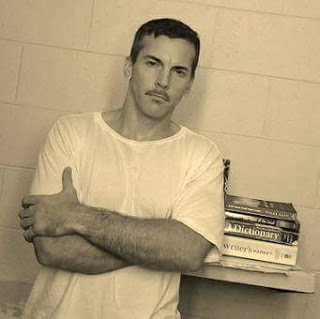 Why don’t you begin by sharing a little about yourself.
Why don’t you begin by sharing a little about yourself.
I'll be 36 in June. As a kid growing up in Ocean Springs, Ms., I knew many freedoms. Some of them illegal.I learned tools at a young age, repairing anything with wheels or an engine, and became a mechanic working at my uncle’s junkyards. At 17, I had to leave home and get my own place. I found a better job at a transmission shop. At 18, I attempted 12th grade for a second time, once more failing to earn my diploma. Not long after, in January, 2000, I was arrested.Spent half my life in prison for a murder conviction. The appeal courts didn't care that it was a fistfight between a couple of teenagers. Nor did they care about the ineffective assistance of my public defender. I considered escaping, but wasn't committed to that idea until hurricane Katrina destroyed several homes in my family. My mom was living in a garage. Plans to leave, find work and help out were, on reflection, decisions of youth. I didn't realize that until after I was caught. The second time.I've been on High Risk in the Mississippi Department of Corrections since 2005. Housed with Death Row - first in Unit 32 Supermax, now in Unit 29 maximum security - I've adapted to extreme inhumane conditions. Segregation in Parchman is desolate and deadly, a criminal finishing school for most, and a mind-eroding dungeon for all.I maintain good mental health with punishing physical exercise. Over the years the discipline has allowed me to develop creativity, in art and fiction writing. I've been an advocate for prisoner rights, a GED tutor, and a mentor. Writing a series of short stories in 2007 changed my life, renewed the hope lost with the appeals and failed escapes. New Pulp Press signed me for two crime thriller trilogies. Book I of Shocking Circumstances was released in January, 2017.Learning to write polished blog posts is my present focus. I'm used to hard boiled noir, and unused to writing about myself.Overcoming the difficulties of self-marketing from Parchman, as an author convicted of murder, would be impossible without the help of my team of volunteer supporters. Over the last several months they have been working behind the scenes creating a website dedicated to raising awareness to the unjust circumstances of my murder conviction, with the ultimate goal of obtaining legal representation for another appeal. The site will also serve as the central hub for my writings and latest news, and can be found at www.unjustelement.com.Most of the marketing for my novels will be done through their various social media platforms. I'll be available to write guest posts or do interviews with the Unjust group handling contacts.
Could you tell us a bit about your latest book?
Book I of Shocking Circumstances introduces Clarice “Shocker” Ares, a boxing legend that chooses to retire and develop her family and businesses.An incident involving drugs, a major Mexican cartel and corrupt police officers results in her imprisonment. Losing her family, home and businesses was only the beginning of a 40 year sentence. The easy part.She decides being a convict wasn't for her, and becomes the Shocker once more, earning money in a prison fight ring to finance her escape.
How long have you been writing, and how many books have you published to date?
In 2007, I wrote a dozen crime thriller shorts about two physically gifted scam artists, Razor and Blondie, that eventually became a collection titled, By Hook or Crook. A friend and I self published it on Amazon in 2012. Two trilogies followed. I’ve written several other shorts, mostly crime fiction, though a couple were dark fiction. Marsh Madness was published by Near to the Knuckle in January, 2017.
Of all the books you've written, do you have a favourite?
Book III of Shocking Circumstances. It opens with a scene based on my second escape in 2006. That part of the trilogy comes to mind whenever I think of sharing excerpts.
Do you have a favourite character? If so, why?
Shocker’s coach, Eddy. He is the kind of person that walks into a room—or gym—and people instinctively look to for direction. He’s an obstacles-are-challenges guy, able to make you feel like a ten foot tall champion of the world. His manner and profession (boxing trainer) are based on my old coach, Fred.Fred taught boxing lessons that he also applied as life lessons, expanding the limits placed on myself as a kid dreaming no further than the mechanic shop. He literally taught me the definition of ambition, and that I had enough to share. And I often do, talking to younger convicts about their goals and using many of his motivational phrases as he did with me.
Why did you decide to write in the crime fiction genre?
I didn't decide on any particular genre. Never considered there were other choices, actually. I just knew I wanted to create a guy and his girlfriend that showed readers how to commit crimes—with smart, original style--and get away with them. I had plenty of material for those.My personal experiences combined with crimes I've learned from others amount to a long list of reference material. After making an actual list I realized I could create an endless number of ways for my characters to do them without being caught. They were fun to write. Crook was written before I began studying fiction writing. Just picked up a pen and scribbled until my hand felt in danger of injury.Creating the criminal acts. Writing out how to do a crime, as opposed to just thinking or talking about it, really lights up the innovative part of me. Thoughts aren't fully realized unless they are written out. Imagination suffers. And what is life without imagination?Designing lives filled with crime is a creative outlet I enjoy even more than drawing or tattooing.
What did you hope to accomplish by publishing your book?
Freedom. Doing life in Parchman gives a guy a little free time. And there are only so many things to do in lockdown. Writing is one of them, and we can do that all we want. One day while brainstorming with friends, we talked about writing books, getting published, and using the royalties to get back in court.That was little more than a fantasy back then. Signing six books with New Pulp Press has brought it closer to reality.
What is your greatest challenge as a writer?
Now that I'm published? Marketing. Becoming mainstream would be like getting struck by lightning. Inside my cell. Cop shows and tough on crime ideals are an everyday bombardment. People will refuse to read my work after seeing my address in the bio. I want to do interviews like this so readers have a chance to learn something about me before judging the value of my novels.
What’s your next project? Any upcoming book secrets you care to reveal?
I just received word from New Pulp Press, asking if they can release Book I of the Sharp as a Razor trilogy while Shocking Circumstances finds its niche.I said, Absolutely! I'm excited about crime fiction fans getting to know Shocker and Razor. They are very different characters. It's going to be fun learning what readers think.Her Name is Mercie is a novella I'm working on. New character, new mayhem. Since finishing Razor, I've learned a few things from publishers that fit nicely in my writer's tool box. Some minor style changes that I played with in a few short stories before drafting Mercie.Those are current and upcoming works. Sorry, I don't tell secrets.
About the Author:
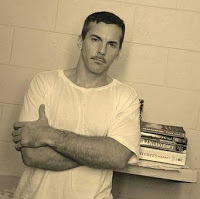
Chris Roy was raised in South Mississippi, in the midst of ugly Gulf Coast beaches and spectacular muddy bayous.Chris lived comfortably with the criminal ventures of his youth until a fistfight in 1999 ended tragically. Since January, 2000, he's been serving a life sentence in the Mississippi Department of Corrections. Nowadays he lives his life crime vicariously, through the edgy, fast-paced stories he pens, hoping to entertain readers. When he isn't writing, he's reading, drawing or looking for prospects to train in boxing.
For more on his books, go here: http://www.newpulppress.com/bookpage/shockingcircumstances.html
For more on the author, go here: www.unjustelement.com
Interview with Chris Roy
 Why don’t you begin by sharing a little about yourself.
Why don’t you begin by sharing a little about yourself.I'll be 36 in June. As a kid growing up in Ocean Springs, Ms., I knew many freedoms. Some of them illegal.I learned tools at a young age, repairing anything with wheels or an engine, and became a mechanic working at my uncle’s junkyards. At 17, I had to leave home and get my own place. I found a better job at a transmission shop. At 18, I attempted 12th grade for a second time, once more failing to earn my diploma. Not long after, in January, 2000, I was arrested.Spent half my life in prison for a murder conviction. The appeal courts didn't care that it was a fistfight between a couple of teenagers. Nor did they care about the ineffective assistance of my public defender. I considered escaping, but wasn't committed to that idea until hurricane Katrina destroyed several homes in my family. My mom was living in a garage. Plans to leave, find work and help out were, on reflection, decisions of youth. I didn't realize that until after I was caught. The second time.I've been on High Risk in the Mississippi Department of Corrections since 2005. Housed with Death Row - first in Unit 32 Supermax, now in Unit 29 maximum security - I've adapted to extreme inhumane conditions. Segregation in Parchman is desolate and deadly, a criminal finishing school for most, and a mind-eroding dungeon for all.I maintain good mental health with punishing physical exercise. Over the years the discipline has allowed me to develop creativity, in art and fiction writing. I've been an advocate for prisoner rights, a GED tutor, and a mentor. Writing a series of short stories in 2007 changed my life, renewed the hope lost with the appeals and failed escapes. New Pulp Press signed me for two crime thriller trilogies. Book I of Shocking Circumstances was released in January, 2017.Learning to write polished blog posts is my present focus. I'm used to hard boiled noir, and unused to writing about myself.Overcoming the difficulties of self-marketing from Parchman, as an author convicted of murder, would be impossible without the help of my team of volunteer supporters. Over the last several months they have been working behind the scenes creating a website dedicated to raising awareness to the unjust circumstances of my murder conviction, with the ultimate goal of obtaining legal representation for another appeal. The site will also serve as the central hub for my writings and latest news, and can be found at www.unjustelement.com.Most of the marketing for my novels will be done through their various social media platforms. I'll be available to write guest posts or do interviews with the Unjust group handling contacts.
Could you tell us a bit about your latest book?
Book I of Shocking Circumstances introduces Clarice “Shocker” Ares, a boxing legend that chooses to retire and develop her family and businesses.An incident involving drugs, a major Mexican cartel and corrupt police officers results in her imprisonment. Losing her family, home and businesses was only the beginning of a 40 year sentence. The easy part.She decides being a convict wasn't for her, and becomes the Shocker once more, earning money in a prison fight ring to finance her escape.
How long have you been writing, and how many books have you published to date?
In 2007, I wrote a dozen crime thriller shorts about two physically gifted scam artists, Razor and Blondie, that eventually became a collection titled, By Hook or Crook. A friend and I self published it on Amazon in 2012. Two trilogies followed. I’ve written several other shorts, mostly crime fiction, though a couple were dark fiction. Marsh Madness was published by Near to the Knuckle in January, 2017.
Of all the books you've written, do you have a favourite?
Book III of Shocking Circumstances. It opens with a scene based on my second escape in 2006. That part of the trilogy comes to mind whenever I think of sharing excerpts.
Do you have a favourite character? If so, why?
Shocker’s coach, Eddy. He is the kind of person that walks into a room—or gym—and people instinctively look to for direction. He’s an obstacles-are-challenges guy, able to make you feel like a ten foot tall champion of the world. His manner and profession (boxing trainer) are based on my old coach, Fred.Fred taught boxing lessons that he also applied as life lessons, expanding the limits placed on myself as a kid dreaming no further than the mechanic shop. He literally taught me the definition of ambition, and that I had enough to share. And I often do, talking to younger convicts about their goals and using many of his motivational phrases as he did with me.
Why did you decide to write in the crime fiction genre?
I didn't decide on any particular genre. Never considered there were other choices, actually. I just knew I wanted to create a guy and his girlfriend that showed readers how to commit crimes—with smart, original style--and get away with them. I had plenty of material for those.My personal experiences combined with crimes I've learned from others amount to a long list of reference material. After making an actual list I realized I could create an endless number of ways for my characters to do them without being caught. They were fun to write. Crook was written before I began studying fiction writing. Just picked up a pen and scribbled until my hand felt in danger of injury.Creating the criminal acts. Writing out how to do a crime, as opposed to just thinking or talking about it, really lights up the innovative part of me. Thoughts aren't fully realized unless they are written out. Imagination suffers. And what is life without imagination?Designing lives filled with crime is a creative outlet I enjoy even more than drawing or tattooing.
What did you hope to accomplish by publishing your book?
Freedom. Doing life in Parchman gives a guy a little free time. And there are only so many things to do in lockdown. Writing is one of them, and we can do that all we want. One day while brainstorming with friends, we talked about writing books, getting published, and using the royalties to get back in court.That was little more than a fantasy back then. Signing six books with New Pulp Press has brought it closer to reality.
What is your greatest challenge as a writer?
Now that I'm published? Marketing. Becoming mainstream would be like getting struck by lightning. Inside my cell. Cop shows and tough on crime ideals are an everyday bombardment. People will refuse to read my work after seeing my address in the bio. I want to do interviews like this so readers have a chance to learn something about me before judging the value of my novels.
What’s your next project? Any upcoming book secrets you care to reveal?
I just received word from New Pulp Press, asking if they can release Book I of the Sharp as a Razor trilogy while Shocking Circumstances finds its niche.I said, Absolutely! I'm excited about crime fiction fans getting to know Shocker and Razor. They are very different characters. It's going to be fun learning what readers think.Her Name is Mercie is a novella I'm working on. New character, new mayhem. Since finishing Razor, I've learned a few things from publishers that fit nicely in my writer's tool box. Some minor style changes that I played with in a few short stories before drafting Mercie.Those are current and upcoming works. Sorry, I don't tell secrets.
About the Author:

Chris Roy was raised in South Mississippi, in the midst of ugly Gulf Coast beaches and spectacular muddy bayous.Chris lived comfortably with the criminal ventures of his youth until a fistfight in 1999 ended tragically. Since January, 2000, he's been serving a life sentence in the Mississippi Department of Corrections. Nowadays he lives his life crime vicariously, through the edgy, fast-paced stories he pens, hoping to entertain readers. When he isn't writing, he's reading, drawing or looking for prospects to train in boxing.
For more on his books, go here: http://www.newpulppress.com/bookpage/shockingcircumstances.html
For more on the author, go here: www.unjustelement.com
Published on March 21, 2017 05:00
March 19, 2017
Interview With Crime Author Elka Ray
Today I have another great interview, this time with crime author Elka Ray. She stops by to chat about her writing and her books, including her latest suspense novel Saigon Dark. Enjoy!
Interview With Elka Ray
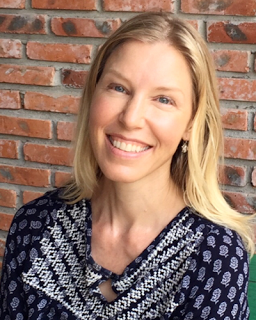
Why don’t you begin by sharing a little about yourself.
I'm an only child and my family moved around a lot when I was a kid. I went to about a dozen different schools in Canada and the UK. Wherever we went I made new friends but then had to leave them, which was hard. What stayed constant were my books. I read and drew a lot as a child and now work as an author, editor and illustrator.
Could you tell us a bit about your latest book?
My suspense novel Saigon Dark came out with Crimewave Press last fall. It follows a Vietnamese-American woman named Lily Vo who's living in Saigon when tragedy strikes. Traumatized and isolated, Lily makes a harrowing choice that comes back to haunt her. It's a story about family, betrayal and belonging - and how hard we'll fight for the people we love. I think deception - especially self-deception - is like poison. In Saigon Dark, I wanted to explore a woman who's unable to tell the truth.
How long have you been writing, and how many books have you published to date?
I studied Journalism and Asian Studies, then spent years doing media and communications work. Having lived in Southeast Asia since the mid-1990s, I focused on travel and cultural articles. I've contributed to many magazines and guidebooks. My first novel, a light romantic mystery called Hanoi Jane, was published in 2011. A short story collection, What You Don't Know: Tales of Obsession, Mystery & Murder in Southeast Asia came out in mid-2016, followed by Saigon Dark at the end of the year.
Why did you decide to write in the crime genre?
I grew up reading classics, then trashy teen novels. In my twenties I read mostly literary fiction. When I was pregnant with my third child, who's now eight, I developed an addiction to crime fiction. You always hear about pregnant women craving weird foods - pickles with ice cream or Big Macs at 4 a.m. I craved mysteries and suspense. I couldn't read enough dark tales.The premise of Saigon Dark had come to me about a year earlier but I started to flesh out the story during that pregnancy. After my daughter's birth my insatiable appetite for crime stories waned a little. I still read a lot of crime today but am not as obsessive as I was during those nine months.You may be wondering how my baby turned out. Well, from an early age, she's been weirdly interested in death. When he was around two, my son used to beg me to visit construction sites. A lot of little boys love trucks and heavy machinery. My daughter, on the other hand, wanted to visit cemeteries. She'd squeal and point, "Grave! Grave!" and ask creepy questions. How did they die? How deep are they buried? How many dead people do I know? Why? Why? I wanted to run away screaming.It's like the chicken or the egg: Did the dark stuff I read shape her? Did she somehow influence my interests when she was in my body? Or is it just a coincidence - with no more meaning than a pregnancy craving for peanut butter?All I know is that during that pregnancy I shifted to writing crime fiction.
Can you tell us about your writing process? Where do your ideas originate? Do you have a certain writing routine?
I live near the beach in Central Vietnam and love to swim. Most days I'm either in the ocean or beach-combing. New characters and stories often materialize when I'm swimming or taking long walks. I also work out tricky plot problems while swimming.Once an idea comes you need to get it down fairly quickly or it's gone. I feel a sense of pressure to get the first draft out - the story you write today won't be the same tomorrow.
Do you have a favourite author, or writing inspiration?
Writers I admire include Daphne du Maurier, George Orwell, Graham Greene, Charles Dickens, Michael Ondaatje, Rohinton Mistry, Dennis Lehane, Scott Smith, Stephen King (although I'm too chicken to read much horror), Sue Miller, Tana French, Donna Tartt, Susan Fletcher... There are many more but look these writers up.
What advice would you give beginning writers?
Read as much and as widely as possible - not just in the genre in which you plan to write. Read literary classics and recent best-sellers. Read fiction and non-fiction. Read writers of Indian descent, whose works tend to be lush and busy. Read Japanese and Scandinavian authors, whose language is often bare-bones. When it comes time to write, read your prose out loud. If you stumble, your sentence is clunky. If you aren't familiar with George Orwell's rules for good writing, look them up. Some useful and well-explained writing advice may be found on this blog: www.emmadarwin.typepad.com/
Do you have any amusing writing stories or anecdotes to share?
Many people don't understand that novelists make stuff up. Most plots did not really happen to us or to anyone we know. Most characters are not thinly-veiled copies of people we've met. Our job is to invent characters and stories that feel true. After reading my short crime stories one woman I know said to me: "Wow! Where do you get these ideas? You don't even watch a lot of TV!"I loved the assumption that writers sit around and steal their material off the tube.You don't choose to be a storyteller: stories either come to you or they don't. What you need as an author is the patience to sit down and write and rewrite (and rewrite, repeat...) those stories until your prose is clear and precise.
What do you like to do when you're not writing? Any hobbies?
As well as writing for adults I write and illustrate for small kids. My drawings are bright and cheerful. I also produce cute, colorful drawings for Vietnam-themed greeting cards and souvenirs. Proceeds go to support poor kids in Vietnam who need genital/urinary surgeries: www.stickyrice.com My latest obsession is gardening - although no one in my family has a green thumb. I replant stuff that grows wild near the beach (aka weeds) because I figure these plants might survive despite our care.
You can find Elka Ray's latest book Saigon Dark on Amazon.
About the Author:
 Elka Ray is a UK/Canadian author and illustrator based in Hoi An, Vietnam. The author of one novel, Hanoi Jane, Elka also writes and draws an expanding series of children’s books about Southeast Asia, including Vietnam A to Z, 123 Vietnam! and The Warrior Queens. For adults, Elka focuses on crime fiction and mysteries. Her short stories have appeared in Monsoon's Crime Scene Asia: Asia's Best Crime Fiction 2014 (Hong Kong); New Asian Fiction (India) 2013 and Lontar: The Journal of Southeast Asian Speculative Fiction (Singapore) 2014. Her travel writing has run in a wide range of publications, including Fodor's, Forbes, Executive Traveller and Persimmon Asian Arts. Elka holds a Canadian degree in Journalism and Asian Studies and a Canadian diploma in Creative Writing. She has a sporty husband and two kids, works as a magazine editor, and has an author’s site at www.elkaray.com. When Elka’s not writing or drawing, she’s in the ocean.
Elka Ray is a UK/Canadian author and illustrator based in Hoi An, Vietnam. The author of one novel, Hanoi Jane, Elka also writes and draws an expanding series of children’s books about Southeast Asia, including Vietnam A to Z, 123 Vietnam! and The Warrior Queens. For adults, Elka focuses on crime fiction and mysteries. Her short stories have appeared in Monsoon's Crime Scene Asia: Asia's Best Crime Fiction 2014 (Hong Kong); New Asian Fiction (India) 2013 and Lontar: The Journal of Southeast Asian Speculative Fiction (Singapore) 2014. Her travel writing has run in a wide range of publications, including Fodor's, Forbes, Executive Traveller and Persimmon Asian Arts. Elka holds a Canadian degree in Journalism and Asian Studies and a Canadian diploma in Creative Writing. She has a sporty husband and two kids, works as a magazine editor, and has an author’s site at www.elkaray.com. When Elka’s not writing or drawing, she’s in the ocean.
Interview With Elka Ray

Why don’t you begin by sharing a little about yourself.
I'm an only child and my family moved around a lot when I was a kid. I went to about a dozen different schools in Canada and the UK. Wherever we went I made new friends but then had to leave them, which was hard. What stayed constant were my books. I read and drew a lot as a child and now work as an author, editor and illustrator.
Could you tell us a bit about your latest book?
My suspense novel Saigon Dark came out with Crimewave Press last fall. It follows a Vietnamese-American woman named Lily Vo who's living in Saigon when tragedy strikes. Traumatized and isolated, Lily makes a harrowing choice that comes back to haunt her. It's a story about family, betrayal and belonging - and how hard we'll fight for the people we love. I think deception - especially self-deception - is like poison. In Saigon Dark, I wanted to explore a woman who's unable to tell the truth.
How long have you been writing, and how many books have you published to date?
I studied Journalism and Asian Studies, then spent years doing media and communications work. Having lived in Southeast Asia since the mid-1990s, I focused on travel and cultural articles. I've contributed to many magazines and guidebooks. My first novel, a light romantic mystery called Hanoi Jane, was published in 2011. A short story collection, What You Don't Know: Tales of Obsession, Mystery & Murder in Southeast Asia came out in mid-2016, followed by Saigon Dark at the end of the year.
Why did you decide to write in the crime genre?
I grew up reading classics, then trashy teen novels. In my twenties I read mostly literary fiction. When I was pregnant with my third child, who's now eight, I developed an addiction to crime fiction. You always hear about pregnant women craving weird foods - pickles with ice cream or Big Macs at 4 a.m. I craved mysteries and suspense. I couldn't read enough dark tales.The premise of Saigon Dark had come to me about a year earlier but I started to flesh out the story during that pregnancy. After my daughter's birth my insatiable appetite for crime stories waned a little. I still read a lot of crime today but am not as obsessive as I was during those nine months.You may be wondering how my baby turned out. Well, from an early age, she's been weirdly interested in death. When he was around two, my son used to beg me to visit construction sites. A lot of little boys love trucks and heavy machinery. My daughter, on the other hand, wanted to visit cemeteries. She'd squeal and point, "Grave! Grave!" and ask creepy questions. How did they die? How deep are they buried? How many dead people do I know? Why? Why? I wanted to run away screaming.It's like the chicken or the egg: Did the dark stuff I read shape her? Did she somehow influence my interests when she was in my body? Or is it just a coincidence - with no more meaning than a pregnancy craving for peanut butter?All I know is that during that pregnancy I shifted to writing crime fiction.
Can you tell us about your writing process? Where do your ideas originate? Do you have a certain writing routine?
I live near the beach in Central Vietnam and love to swim. Most days I'm either in the ocean or beach-combing. New characters and stories often materialize when I'm swimming or taking long walks. I also work out tricky plot problems while swimming.Once an idea comes you need to get it down fairly quickly or it's gone. I feel a sense of pressure to get the first draft out - the story you write today won't be the same tomorrow.
Do you have a favourite author, or writing inspiration?
Writers I admire include Daphne du Maurier, George Orwell, Graham Greene, Charles Dickens, Michael Ondaatje, Rohinton Mistry, Dennis Lehane, Scott Smith, Stephen King (although I'm too chicken to read much horror), Sue Miller, Tana French, Donna Tartt, Susan Fletcher... There are many more but look these writers up.
What advice would you give beginning writers?
Read as much and as widely as possible - not just in the genre in which you plan to write. Read literary classics and recent best-sellers. Read fiction and non-fiction. Read writers of Indian descent, whose works tend to be lush and busy. Read Japanese and Scandinavian authors, whose language is often bare-bones. When it comes time to write, read your prose out loud. If you stumble, your sentence is clunky. If you aren't familiar with George Orwell's rules for good writing, look them up. Some useful and well-explained writing advice may be found on this blog: www.emmadarwin.typepad.com/
Do you have any amusing writing stories or anecdotes to share?
Many people don't understand that novelists make stuff up. Most plots did not really happen to us or to anyone we know. Most characters are not thinly-veiled copies of people we've met. Our job is to invent characters and stories that feel true. After reading my short crime stories one woman I know said to me: "Wow! Where do you get these ideas? You don't even watch a lot of TV!"I loved the assumption that writers sit around and steal their material off the tube.You don't choose to be a storyteller: stories either come to you or they don't. What you need as an author is the patience to sit down and write and rewrite (and rewrite, repeat...) those stories until your prose is clear and precise.
What do you like to do when you're not writing? Any hobbies?
As well as writing for adults I write and illustrate for small kids. My drawings are bright and cheerful. I also produce cute, colorful drawings for Vietnam-themed greeting cards and souvenirs. Proceeds go to support poor kids in Vietnam who need genital/urinary surgeries: www.stickyrice.com My latest obsession is gardening - although no one in my family has a green thumb. I replant stuff that grows wild near the beach (aka weeds) because I figure these plants might survive despite our care.
You can find Elka Ray's latest book Saigon Dark on Amazon.
About the Author:
 Elka Ray is a UK/Canadian author and illustrator based in Hoi An, Vietnam. The author of one novel, Hanoi Jane, Elka also writes and draws an expanding series of children’s books about Southeast Asia, including Vietnam A to Z, 123 Vietnam! and The Warrior Queens. For adults, Elka focuses on crime fiction and mysteries. Her short stories have appeared in Monsoon's Crime Scene Asia: Asia's Best Crime Fiction 2014 (Hong Kong); New Asian Fiction (India) 2013 and Lontar: The Journal of Southeast Asian Speculative Fiction (Singapore) 2014. Her travel writing has run in a wide range of publications, including Fodor's, Forbes, Executive Traveller and Persimmon Asian Arts. Elka holds a Canadian degree in Journalism and Asian Studies and a Canadian diploma in Creative Writing. She has a sporty husband and two kids, works as a magazine editor, and has an author’s site at www.elkaray.com. When Elka’s not writing or drawing, she’s in the ocean.
Elka Ray is a UK/Canadian author and illustrator based in Hoi An, Vietnam. The author of one novel, Hanoi Jane, Elka also writes and draws an expanding series of children’s books about Southeast Asia, including Vietnam A to Z, 123 Vietnam! and The Warrior Queens. For adults, Elka focuses on crime fiction and mysteries. Her short stories have appeared in Monsoon's Crime Scene Asia: Asia's Best Crime Fiction 2014 (Hong Kong); New Asian Fiction (India) 2013 and Lontar: The Journal of Southeast Asian Speculative Fiction (Singapore) 2014. Her travel writing has run in a wide range of publications, including Fodor's, Forbes, Executive Traveller and Persimmon Asian Arts. Elka holds a Canadian degree in Journalism and Asian Studies and a Canadian diploma in Creative Writing. She has a sporty husband and two kids, works as a magazine editor, and has an author’s site at www.elkaray.com. When Elka’s not writing or drawing, she’s in the ocean.
Published on March 19, 2017 05:00
March 17, 2017
Book Spotlight: Maharia
Today I have a real treat with a book spotlight on the epic fantasy novel Maharia by Joshua Robertson. This book is the third novel in the Kaelandurseries, which now comes in a box set. There’s also an excerpt from Maharia, so enjoy…
Maharia by Joshua Robertson
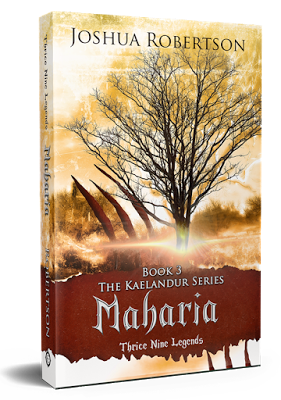
In Valor There Is Hope!Branimir has remained hidden from the enemy, withholding the cursed dagger from their erroneous hands. When a stranger arrives, and offers the chance to end his never-ending battle, Branimir sets off for the City of the Gods for answers. Now, hoping his faith has not been misplaced, Branimir undergoes his darkest adventure yet. He can only trust that he has the courage to survive the truth.
Both the latest novel and the box set are available from Amazon:
MahariaKaelandur Box Set
Also, the first book in the series the first book, Melkorka , is on sale for 99 cents!
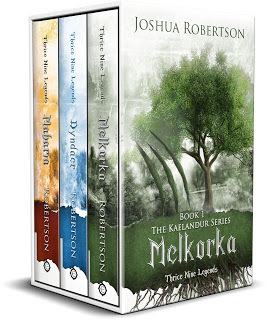
Excerpt from Maharia
Branimir’s heart jumped at the thought of leaving Gaetana. He spun around and rose to his feet. Adamus faced him, beard hanging to his chest, and blue eyes wild with excitement. Witigor, a head taller than the Ariadnean, joggled his head in agreement, the overhanging flap of his ridiculous brown hat bouncing over his brow.Sulanna stilled them with her hand. “What about Dorofej? The Stuhia has not survived this long simply to stay captive in a dungeon. Are we to continue to trust that he will find a way to escape?”“Tis a thought I hope to be true, Sulanna,” Adamus said, “though the odds are not favorable. I am not proposing we attempt to free Dorofej. We simply cannot stay here much longer. Besides, if Dorofej does escape, he can always find us with that thing he does.”“Klukas,” Branimir said. “Yes. He can find us in the shadow world.”“Oh, here we are again, talking of this mysterious, all-knowing man called Dorofej.” Wit grimaced, pulling the sleeves up on his shirt. “The man might as well be a god, the way you speak of him.” Wit’s eye twitched. “Still, you are correct on this matter. The Stuhia can find anyone in Klukasif they have come across them before. Their gift of scrying supersedes the skill of the greatest oracle. He would be able to find you no matter your destination, I assure you.”“Oh. Are you suddenly an expert with the Stuhian people, Wit?” Sulanna mocked, twisting her mouth with suspicion. “Funny you have not said a word of them until recently.”“Well…I have read Tom Flitter’s Mystagogical’s Forlorn Folio and Colin Turney’s Unchanted and Unequaled.” Wit crossed his arms, leaned back like he had taken a blow to the bits, and then wobbled his head back and forth in disbelief. “Do you not know I have access to every book in the known world, Sulanna? I would have been reading about the dragon people long before now if I had known anyone cared to know about them. But you three keep your tongues wrapped so tight, I would not be surprised if you did not have any tongues at all. I don’t know how you expect me to help.”Branimir stuck out his tongue. “No one asked for your help. We asked for one book on ancient religions, and here you still are—”“Yes, I remember. The Compendium of Infernal Light by Emrys Trudgeon.” Wit widened his eyes. “No other man could have gotten you that little treasure. If you don’t want me, I can be on my way.” He stomped the back of his foot against the earth, indicating he had no intention of budging. “You know, it is not everyday someone asks about a text not highlighting the Lightbringer.”“Czern’s breath. You mustn’t go anywhere,” Adamus said, angling an eyebrow at Branimir.Sulanna flashed her teeth, chiming in, “Indeed. Your input is always welcome, but our business will remain our own.” “Of course, my Lady,” Wit said, nodding his head again with enough momentum to bounce his hat. “And I don’t mean to pry, but anything you need to know, I can find.” He winked, pointing at Branimir. “Don’t get me wrong. The Kras have wicked memories, but none are as old as books. None can know how their minds have twisted their words over time.”



Author Bio:
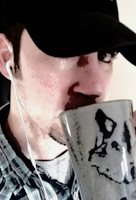 Joshua Robertson is a bestselling author in dark fantasy. Robertson is a Licensed Master Social Worker, who received his degree from Wichita State University. He has worked with children and families for the past fifteen years in a variety of unique venues: a residential behavior school, a psychiatric treatment facility, and the child welfare system. He has functioned as a supervisor, an educator, a behavior specialist, and a therapist during his career. Mr. Robertson has presented trainings for hundreds of professionals and military personnel on topics that include child abuse and neglect, human trafficking, strengthening the parent and child relationships, and the neurobiological impact of trauma.
Joshua Robertson is a bestselling author in dark fantasy. Robertson is a Licensed Master Social Worker, who received his degree from Wichita State University. He has worked with children and families for the past fifteen years in a variety of unique venues: a residential behavior school, a psychiatric treatment facility, and the child welfare system. He has functioned as a supervisor, an educator, a behavior specialist, and a therapist during his career. Mr. Robertson has presented trainings for hundreds of professionals and military personnel on topics that include child abuse and neglect, human trafficking, strengthening the parent and child relationships, and the neurobiological impact of trauma.
You may recognize him as the dude whose dragons were said to destroy George R.R. Martin's and Christopher Paolini's dragons in a very biased Twitter poll. His first novel, Melkorka, was released in 2015, and he has been writing fantasy fiction like clockwork ever since. Known most for his Thrice Nine Legends Saga, Robertson enjoys an ever-expanding and extremely loyal following of readers.
He currently lives in North Carolina with his better half and his horde of goblins.
You can find more about Joshua Robertson and his books at these sites:
Twitter Facebook Website
Maharia by Joshua Robertson

In Valor There Is Hope!Branimir has remained hidden from the enemy, withholding the cursed dagger from their erroneous hands. When a stranger arrives, and offers the chance to end his never-ending battle, Branimir sets off for the City of the Gods for answers. Now, hoping his faith has not been misplaced, Branimir undergoes his darkest adventure yet. He can only trust that he has the courage to survive the truth.
Both the latest novel and the box set are available from Amazon:
MahariaKaelandur Box Set
Also, the first book in the series the first book, Melkorka , is on sale for 99 cents!

Excerpt from Maharia
Branimir’s heart jumped at the thought of leaving Gaetana. He spun around and rose to his feet. Adamus faced him, beard hanging to his chest, and blue eyes wild with excitement. Witigor, a head taller than the Ariadnean, joggled his head in agreement, the overhanging flap of his ridiculous brown hat bouncing over his brow.Sulanna stilled them with her hand. “What about Dorofej? The Stuhia has not survived this long simply to stay captive in a dungeon. Are we to continue to trust that he will find a way to escape?”“Tis a thought I hope to be true, Sulanna,” Adamus said, “though the odds are not favorable. I am not proposing we attempt to free Dorofej. We simply cannot stay here much longer. Besides, if Dorofej does escape, he can always find us with that thing he does.”“Klukas,” Branimir said. “Yes. He can find us in the shadow world.”“Oh, here we are again, talking of this mysterious, all-knowing man called Dorofej.” Wit grimaced, pulling the sleeves up on his shirt. “The man might as well be a god, the way you speak of him.” Wit’s eye twitched. “Still, you are correct on this matter. The Stuhia can find anyone in Klukasif they have come across them before. Their gift of scrying supersedes the skill of the greatest oracle. He would be able to find you no matter your destination, I assure you.”“Oh. Are you suddenly an expert with the Stuhian people, Wit?” Sulanna mocked, twisting her mouth with suspicion. “Funny you have not said a word of them until recently.”“Well…I have read Tom Flitter’s Mystagogical’s Forlorn Folio and Colin Turney’s Unchanted and Unequaled.” Wit crossed his arms, leaned back like he had taken a blow to the bits, and then wobbled his head back and forth in disbelief. “Do you not know I have access to every book in the known world, Sulanna? I would have been reading about the dragon people long before now if I had known anyone cared to know about them. But you three keep your tongues wrapped so tight, I would not be surprised if you did not have any tongues at all. I don’t know how you expect me to help.”Branimir stuck out his tongue. “No one asked for your help. We asked for one book on ancient religions, and here you still are—”“Yes, I remember. The Compendium of Infernal Light by Emrys Trudgeon.” Wit widened his eyes. “No other man could have gotten you that little treasure. If you don’t want me, I can be on my way.” He stomped the back of his foot against the earth, indicating he had no intention of budging. “You know, it is not everyday someone asks about a text not highlighting the Lightbringer.”“Czern’s breath. You mustn’t go anywhere,” Adamus said, angling an eyebrow at Branimir.Sulanna flashed her teeth, chiming in, “Indeed. Your input is always welcome, but our business will remain our own.” “Of course, my Lady,” Wit said, nodding his head again with enough momentum to bounce his hat. “And I don’t mean to pry, but anything you need to know, I can find.” He winked, pointing at Branimir. “Don’t get me wrong. The Kras have wicked memories, but none are as old as books. None can know how their minds have twisted their words over time.”



Author Bio:
 Joshua Robertson is a bestselling author in dark fantasy. Robertson is a Licensed Master Social Worker, who received his degree from Wichita State University. He has worked with children and families for the past fifteen years in a variety of unique venues: a residential behavior school, a psychiatric treatment facility, and the child welfare system. He has functioned as a supervisor, an educator, a behavior specialist, and a therapist during his career. Mr. Robertson has presented trainings for hundreds of professionals and military personnel on topics that include child abuse and neglect, human trafficking, strengthening the parent and child relationships, and the neurobiological impact of trauma.
Joshua Robertson is a bestselling author in dark fantasy. Robertson is a Licensed Master Social Worker, who received his degree from Wichita State University. He has worked with children and families for the past fifteen years in a variety of unique venues: a residential behavior school, a psychiatric treatment facility, and the child welfare system. He has functioned as a supervisor, an educator, a behavior specialist, and a therapist during his career. Mr. Robertson has presented trainings for hundreds of professionals and military personnel on topics that include child abuse and neglect, human trafficking, strengthening the parent and child relationships, and the neurobiological impact of trauma.You may recognize him as the dude whose dragons were said to destroy George R.R. Martin's and Christopher Paolini's dragons in a very biased Twitter poll. His first novel, Melkorka, was released in 2015, and he has been writing fantasy fiction like clockwork ever since. Known most for his Thrice Nine Legends Saga, Robertson enjoys an ever-expanding and extremely loyal following of readers.
He currently lives in North Carolina with his better half and his horde of goblins.
You can find more about Joshua Robertson and his books at these sites:
Twitter Facebook Website
Published on March 17, 2017 05:00
March 16, 2017
Interview With Author Brian Stoddart
Today I have a great interview with author Brian Stoddart, who stops by to chat about his writing and his latest historical crime novel, A Straits Settlement. Enjoy!
Interview With Brian Stoddart
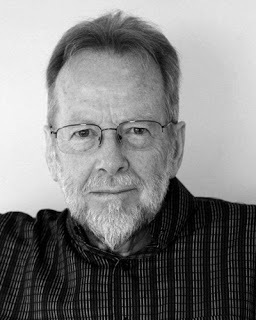 Why don’t you begin by sharing a little about yourself.
Why don’t you begin by sharing a little about yourself.
I grew up in NZ, did a PhD in the history of modern India at the University of Western Australia, and that started a long association with Asia. Professionally I became an academic teaching in Australia, Canada, the Caribbean and elsewhere, before becoming a university executive and Vice Chancellor/President at la Trobe University in Australia. Since then I have worked as a consultant on World Bank, Asian Development Bank and European Union projects in the Middle East and Southeast Asia as well as writing for the media and academic sites on international relations and associated matters. In addition to that I give lectures on cruise ships, am interested in photography and mountain biking as well as art and antique collecting. And, of course, writing crime novels.
Could you tell us a bit about your latest book?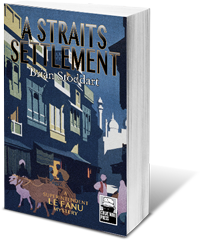
The latest book is “A Straits Settlement”, the third in the Superintendent Le Fanu series set in Madras in India during the 1920s as Britain faces increased opposition to imperial rule. Two cases take him across the Bay of Bengal to Penang in the Straits Settlements in pursuit of both a murderer and an artefact thief. Along the way he meets another of the complicated women who appear in his life, and is also offered a serious opportunity to leave India for a job in the Settlements. Through all this run the themes of Indian independence, police and official reactions, racial tension and all the other twists that go with a colonial condition.
How long have you been writing, and how many books have you published to date?
As noted, this is the third novel I have done, and they follow eighteen books of nonfiction with a couple more of those to come. I began writing as an academic then also started writing journalistically and broadcasting that taught me about wider audiences. I have written on Indian history and politics, on the social history of sport, a biography of an Indian Civil Service, and a memoir of living in Damascus shortly before the current conflict (“A House in Damascus: Before the Fall”) that was a #1 on Amazon for Middle East Travel and Middle East General. I am now also writing screenplays and television scripts.
Of all the books you've written, do you have a favourite?
Because all the books have been different, the favourite is usually the one that appeared most recently! Every time a work comes out I get a real buzz because it is an achievement, and I like the sense of that achievement because it drives me on to the next one (or several, as is usually the case with me).
Do you have a favourite character? If so, why?
Chris Le Fanu is a favourite because I have created him and put him in a British Raj setting that allows me to tell stories in a way I could not as an academic. I also like a real “character” I wrote about, Arthur Galletti (“A People’s Collector in the British Raj: Arthur Galletti”) who was an Anglo-Italian member of the Indian Civil Service in Madras who was the genuine square peg in a round hole – and some of his traits rubbed off on Le Fanu. Among my favourite characters written by others are John Rebus (of course) by Ian Rankin; Bernie Gunther (Philip Kerr); Montalbano (Andrea Camilleri);and those created by the likes of Sarah Paretsky, Denise Mina, Jeff Siger, Paker Bilal, John Enright, Greg McGee writing both as himself and as Alix Bosco; Valentina Giambanco and many others.
Why did you decide to write in the crime fiction genre?
The modern “crime” novel is in many ways is about social history, because invariably it now scours the social conditions that propel characters to act and react the way they do. Unlike in the classic form of the crime novel, the modern works are more about circumstances and context than about the “puzzle”, and they develop the characters a lot more as a result. In my case, the British India setting allows me to explore the full range of tensions that marked the imperial world, and crime, justice and resolution allow all those dramas to be played to the full.
What do you enjoy most about writing in the crime fiction genre?
Probably encountering the strange turns that characters take when I least expect it. I am a minimal planner (although as the series develops that is becoming less so by necessity). Because of that, the stories and the characters almost take on a life of their own once I am in “the zone”, and that is great because of the uncertainty and the inspiration that results.
When did you realize you wanted to be a writer?
In many respects I have always been a “writer”. What has happened over the years is that I have developed more as a writer, not just by shifting through fields and genres but also dealing with wider readerships and learning different skills that improve me as a writer. Books have always been in my life and writers always important. All that said, it has been a joy to become part of the “crime” scene where other writers are so hugely supportive and encouraging.
Can you tell us about your writing process? Where do your ideas originate? Do you have a certain writing routine?
In mechanical terms I set a minimum of 2000 words a day and will often get well beyond that once on “a roll”. I tend to start in the morning and aim to finish by early afternoon. The first thing usually is to read and rectify the previous chapter I have written both to remind myself of where I am up to and to try and write as tightly as possible. Because I write historical crime fiction the ideas are set firmly in the historical record, then the characters start to develop actions around that. Ideas for those actions can come to me at any time so capturing them becomes important.
Do you have a favourite author, or writing inspiration?
I have a lot of favourites, including those listed above. I really look for style and setting, and that leads me to a lot of “foreign” crime where I can learn a lot about description and dialogue. In addition, I am influenced a lot by really great crime TV series where the writers accomplish great things through dialogue and development – Anthony Horowitz and “Foyle’s War” springs to mind, as does Neil Cross and “Luther” and all of Sally Wainwright’s work.
How do you research your books?
Given my background and training, a lot of research for the crime novels has been done, at least in the setting. Most of the research as a result focuses on detail like weapons of the period, aspects of the Madras locale, accuracy in names etc. More broadly, though, I am a genuine “archive rat” so do a lot of research on anything I write.
What do you like to do when you're not writing? Any hobbies?
I read as much as I can because that is part of learning. Then, I am a keen photographer, mainly landscape, because I find that very creative. In a related way I am very keen on collecting art and being around artists. And I collect the Straits Chinese porcelain that appears in “A Straits Settlement” because each piece has a story to tell in its own right.
Are you working on another book?
I am working on another crime novel and on a couple of non-fictions, one a true crime and the other more a piece of mainstream social history. But I find though all three are different, the writing feeds into each in a curiously similar way.
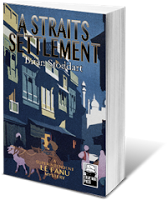
You can find out more out Brian and his books at his Amazon page. A Straits Settlement is available at Amazon
Interview With Brian Stoddart
 Why don’t you begin by sharing a little about yourself.
Why don’t you begin by sharing a little about yourself.I grew up in NZ, did a PhD in the history of modern India at the University of Western Australia, and that started a long association with Asia. Professionally I became an academic teaching in Australia, Canada, the Caribbean and elsewhere, before becoming a university executive and Vice Chancellor/President at la Trobe University in Australia. Since then I have worked as a consultant on World Bank, Asian Development Bank and European Union projects in the Middle East and Southeast Asia as well as writing for the media and academic sites on international relations and associated matters. In addition to that I give lectures on cruise ships, am interested in photography and mountain biking as well as art and antique collecting. And, of course, writing crime novels.
Could you tell us a bit about your latest book?

The latest book is “A Straits Settlement”, the third in the Superintendent Le Fanu series set in Madras in India during the 1920s as Britain faces increased opposition to imperial rule. Two cases take him across the Bay of Bengal to Penang in the Straits Settlements in pursuit of both a murderer and an artefact thief. Along the way he meets another of the complicated women who appear in his life, and is also offered a serious opportunity to leave India for a job in the Settlements. Through all this run the themes of Indian independence, police and official reactions, racial tension and all the other twists that go with a colonial condition.
How long have you been writing, and how many books have you published to date?
As noted, this is the third novel I have done, and they follow eighteen books of nonfiction with a couple more of those to come. I began writing as an academic then also started writing journalistically and broadcasting that taught me about wider audiences. I have written on Indian history and politics, on the social history of sport, a biography of an Indian Civil Service, and a memoir of living in Damascus shortly before the current conflict (“A House in Damascus: Before the Fall”) that was a #1 on Amazon for Middle East Travel and Middle East General. I am now also writing screenplays and television scripts.
Of all the books you've written, do you have a favourite?
Because all the books have been different, the favourite is usually the one that appeared most recently! Every time a work comes out I get a real buzz because it is an achievement, and I like the sense of that achievement because it drives me on to the next one (or several, as is usually the case with me).
Do you have a favourite character? If so, why?
Chris Le Fanu is a favourite because I have created him and put him in a British Raj setting that allows me to tell stories in a way I could not as an academic. I also like a real “character” I wrote about, Arthur Galletti (“A People’s Collector in the British Raj: Arthur Galletti”) who was an Anglo-Italian member of the Indian Civil Service in Madras who was the genuine square peg in a round hole – and some of his traits rubbed off on Le Fanu. Among my favourite characters written by others are John Rebus (of course) by Ian Rankin; Bernie Gunther (Philip Kerr); Montalbano (Andrea Camilleri);and those created by the likes of Sarah Paretsky, Denise Mina, Jeff Siger, Paker Bilal, John Enright, Greg McGee writing both as himself and as Alix Bosco; Valentina Giambanco and many others.
Why did you decide to write in the crime fiction genre?
The modern “crime” novel is in many ways is about social history, because invariably it now scours the social conditions that propel characters to act and react the way they do. Unlike in the classic form of the crime novel, the modern works are more about circumstances and context than about the “puzzle”, and they develop the characters a lot more as a result. In my case, the British India setting allows me to explore the full range of tensions that marked the imperial world, and crime, justice and resolution allow all those dramas to be played to the full.
What do you enjoy most about writing in the crime fiction genre?
Probably encountering the strange turns that characters take when I least expect it. I am a minimal planner (although as the series develops that is becoming less so by necessity). Because of that, the stories and the characters almost take on a life of their own once I am in “the zone”, and that is great because of the uncertainty and the inspiration that results.
When did you realize you wanted to be a writer?
In many respects I have always been a “writer”. What has happened over the years is that I have developed more as a writer, not just by shifting through fields and genres but also dealing with wider readerships and learning different skills that improve me as a writer. Books have always been in my life and writers always important. All that said, it has been a joy to become part of the “crime” scene where other writers are so hugely supportive and encouraging.
Can you tell us about your writing process? Where do your ideas originate? Do you have a certain writing routine?
In mechanical terms I set a minimum of 2000 words a day and will often get well beyond that once on “a roll”. I tend to start in the morning and aim to finish by early afternoon. The first thing usually is to read and rectify the previous chapter I have written both to remind myself of where I am up to and to try and write as tightly as possible. Because I write historical crime fiction the ideas are set firmly in the historical record, then the characters start to develop actions around that. Ideas for those actions can come to me at any time so capturing them becomes important.
Do you have a favourite author, or writing inspiration?
I have a lot of favourites, including those listed above. I really look for style and setting, and that leads me to a lot of “foreign” crime where I can learn a lot about description and dialogue. In addition, I am influenced a lot by really great crime TV series where the writers accomplish great things through dialogue and development – Anthony Horowitz and “Foyle’s War” springs to mind, as does Neil Cross and “Luther” and all of Sally Wainwright’s work.
How do you research your books?
Given my background and training, a lot of research for the crime novels has been done, at least in the setting. Most of the research as a result focuses on detail like weapons of the period, aspects of the Madras locale, accuracy in names etc. More broadly, though, I am a genuine “archive rat” so do a lot of research on anything I write.
What do you like to do when you're not writing? Any hobbies?
I read as much as I can because that is part of learning. Then, I am a keen photographer, mainly landscape, because I find that very creative. In a related way I am very keen on collecting art and being around artists. And I collect the Straits Chinese porcelain that appears in “A Straits Settlement” because each piece has a story to tell in its own right.
Are you working on another book?
I am working on another crime novel and on a couple of non-fictions, one a true crime and the other more a piece of mainstream social history. But I find though all three are different, the writing feeds into each in a curiously similar way.

You can find out more out Brian and his books at his Amazon page. A Straits Settlement is available at Amazon
Published on March 16, 2017 05:00
March 15, 2017
Drabble Wednesday: Crones
Today on Drabble Wednesday, beware the little old ladies...

Granny’s Little Helpers
Somewhere, an old woman stands on a back porch at dusk, a large canvas sack at her feet. She murmurs into the night...“Come my little darlings, Granny has a treat! A sup or two of blood, a morsel of fresh meat. That’s right, that’s right, the tastiest delight. Slink my pretties, from the shadows dim, and slither forth, from the graveyard grim. I need your teeth and your claws, to tear and chew, devour with your jaws.”Blackness shimmers, and tiny voices chitter.The old woman smiles.“Come, come, time to eat. Granny has a body, the finest treat.”
~*~
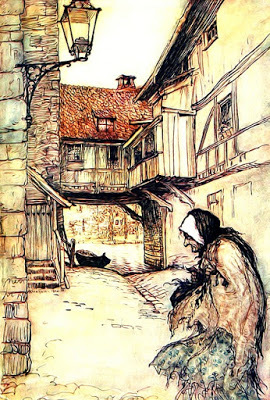
By the River
The old woman cackled, her scrawny jowl flaps bouncing a little. “You should’ve listened, fool. Them old legends you scoffed at, should’ve listened. I ain’t never lost a challenge. And I wasn’t sure going to start with the likes of you.”Rupert started at the dice, and the old lady squatting on her haunches by the riverbank. “It’s not possible. You couldn’t have won the game.”“Why? ‘Cause those dice of yours is weighted? All rigged to cheat? That don’t matter none to me. Game’s always rigged in my favour.” She laughed again. “Pay up, fool. One soul, as promised.”
~*~
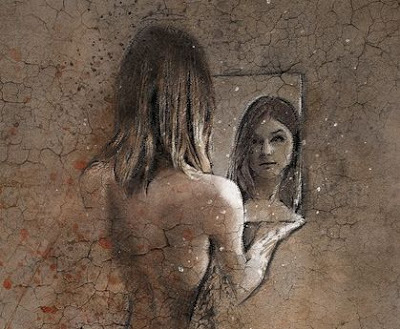
Reflections of the Soul
Arabella didn’t like mirrors.She didn’t primp and she didn’t preen, despite her perfect face with its pristine complexion, or her soft blond hair with its ideal curls. She avoided her reflection as often as possible.“Such a vain thing,” she’d say with a laugh. “I have better things to do.”Perhaps she did. Arabella did like to dabble in things dark and unseemly.Her nature, really. She liked to pretend otherwise, but nature won out. Especially in the mirror.There her true face reflected back at her, all three hundred years, and all the wear of being a witch.
© A. F. Stewart 2017 All Rights Reserved

Granny’s Little Helpers
Somewhere, an old woman stands on a back porch at dusk, a large canvas sack at her feet. She murmurs into the night...“Come my little darlings, Granny has a treat! A sup or two of blood, a morsel of fresh meat. That’s right, that’s right, the tastiest delight. Slink my pretties, from the shadows dim, and slither forth, from the graveyard grim. I need your teeth and your claws, to tear and chew, devour with your jaws.”Blackness shimmers, and tiny voices chitter.The old woman smiles.“Come, come, time to eat. Granny has a body, the finest treat.”
~*~

By the River
The old woman cackled, her scrawny jowl flaps bouncing a little. “You should’ve listened, fool. Them old legends you scoffed at, should’ve listened. I ain’t never lost a challenge. And I wasn’t sure going to start with the likes of you.”Rupert started at the dice, and the old lady squatting on her haunches by the riverbank. “It’s not possible. You couldn’t have won the game.”“Why? ‘Cause those dice of yours is weighted? All rigged to cheat? That don’t matter none to me. Game’s always rigged in my favour.” She laughed again. “Pay up, fool. One soul, as promised.”
~*~

Reflections of the Soul
Arabella didn’t like mirrors.She didn’t primp and she didn’t preen, despite her perfect face with its pristine complexion, or her soft blond hair with its ideal curls. She avoided her reflection as often as possible.“Such a vain thing,” she’d say with a laugh. “I have better things to do.”Perhaps she did. Arabella did like to dabble in things dark and unseemly.Her nature, really. She liked to pretend otherwise, but nature won out. Especially in the mirror.There her true face reflected back at her, all three hundred years, and all the wear of being a witch.
© A. F. Stewart 2017 All Rights Reserved
Published on March 15, 2017 05:00
March 14, 2017
Interview With Author John B. Bliss
Today I have a terrific interview with crime and YA author John B. Bliss, who chats about his writing and his book, The Murder Boys. Enjoy.
Interview With John B. Bliss
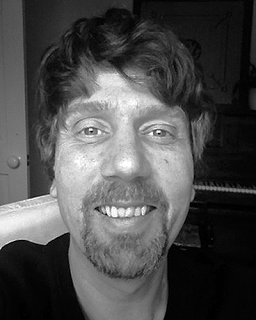
Why don’t you begin by sharing a little about yourself.
Sure, I'm a writer from Brighton UK. My first novel, The Murder Boys, was published by Crime Wave Press last year. In my day job guise, I'm an English teacher at a busy secondary school in Brighton - and that keeps me in touch with my audience. If you can't please them - forget it!
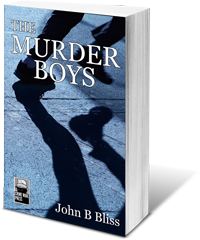 Could you tell us a bit about your latest book?
Could you tell us a bit about your latest book?
The Murder Boys is about two friends learning to live with guilt and fending for themselves as fugitives. It's set alongside the banks of the River Thames in late 1970s Oxfordshire and Berkshire.
Do you have a favourite character? If so, why?
It's got to be the villain of The Murder Boys, Macaulay. He's basically a psychopathic ex-policeman who is drawn to violence. What I hope is the reader's imagination really goes to work with him because my narrator, Richard, never really completely understands Macauley's motivations. Well, until the end maybe...
Why did you decide to write in the YA genre?
I kind of fell into writing for young adults; my writing just came out that way. Now I think about it, I suppose you get a sense of wonder from a teenage narrator, and as a writer you can show the world opening up to innocent eyes; that's a great process!
Who is your intended readership?
Well as I say, I kind of fell into YA writing. I wanted to write a great memorable story, and I guess when you set out to do that, you sort of write something that you would love to read. When publishers got hold of it, they started calling it a YA novel and yeah I get that young readers like it. It's about how frightening the world can be and about finding strength despite that, and those ideas are always going to appeal to a young audience.
Why did you write this book? What was your inspiration?
There's elements of autobiography there - although it's probably not a great idea to say which bits actually happened to me! I'll let readers wonder about that... Like most story telling it came out of a need to tell a tale, one that wouldn't go away no matter how much I tried to ignore it. In the end I just had to get it down in words and out there.
What did you enjoy most about writing your book?
I guess it's the immersion in the world of the book. After a certain point, it's as if the characters get up off the page and start walking around and talking to you. When that happens you know you're onto something. Everyone who has read The Murder Boys has commented on the strong characters but I can't really claim any credit for that. I just opened the cage and let the monsters out!
Can you tell us about your writing process? Where do your ideas originate? Do you have a certain writing routine?
I'm great believer in writing first thing in the morning. The main reason for that is the writer is closest then to the world of dreams and the sub-conscious and for me that means the imagination is at its most potent. There's a lot of great stuff on this subject in a fantastic book called Becoming A Writer by Dorothea Brande. It really is the only writing book worth reading in my opinion. Anyone thinking of writing should check it out.
Do you have a favourite author, or writing inspiration?
I just love any writing that hits you between the eyes and makes a stupid grin creep across your face. There's so much out there that does this for me but I wouldn't have started writing The Murder Boys without reading The Wasp Factory by Iain Banks, A Clockwork Orange by Anthony Burgess or Trainspotting by Irvine Welsh that's for sure!
About the Author:
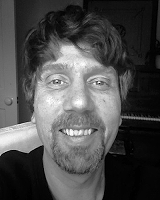
John B Bliss is a crime writer from Brighton, UK.His writing explores society's seedy underbelly: the derelict and forgotten characters left at the margins. The Murder Boys is his first full-length novel and he is currently working on a sequel.
The Murder Boys is available on Amazon
Interview With John B. Bliss

Why don’t you begin by sharing a little about yourself.
Sure, I'm a writer from Brighton UK. My first novel, The Murder Boys, was published by Crime Wave Press last year. In my day job guise, I'm an English teacher at a busy secondary school in Brighton - and that keeps me in touch with my audience. If you can't please them - forget it!
 Could you tell us a bit about your latest book?
Could you tell us a bit about your latest book?The Murder Boys is about two friends learning to live with guilt and fending for themselves as fugitives. It's set alongside the banks of the River Thames in late 1970s Oxfordshire and Berkshire.
Do you have a favourite character? If so, why?
It's got to be the villain of The Murder Boys, Macaulay. He's basically a psychopathic ex-policeman who is drawn to violence. What I hope is the reader's imagination really goes to work with him because my narrator, Richard, never really completely understands Macauley's motivations. Well, until the end maybe...
Why did you decide to write in the YA genre?
I kind of fell into writing for young adults; my writing just came out that way. Now I think about it, I suppose you get a sense of wonder from a teenage narrator, and as a writer you can show the world opening up to innocent eyes; that's a great process!
Who is your intended readership?
Well as I say, I kind of fell into YA writing. I wanted to write a great memorable story, and I guess when you set out to do that, you sort of write something that you would love to read. When publishers got hold of it, they started calling it a YA novel and yeah I get that young readers like it. It's about how frightening the world can be and about finding strength despite that, and those ideas are always going to appeal to a young audience.
Why did you write this book? What was your inspiration?
There's elements of autobiography there - although it's probably not a great idea to say which bits actually happened to me! I'll let readers wonder about that... Like most story telling it came out of a need to tell a tale, one that wouldn't go away no matter how much I tried to ignore it. In the end I just had to get it down in words and out there.
What did you enjoy most about writing your book?
I guess it's the immersion in the world of the book. After a certain point, it's as if the characters get up off the page and start walking around and talking to you. When that happens you know you're onto something. Everyone who has read The Murder Boys has commented on the strong characters but I can't really claim any credit for that. I just opened the cage and let the monsters out!
Can you tell us about your writing process? Where do your ideas originate? Do you have a certain writing routine?
I'm great believer in writing first thing in the morning. The main reason for that is the writer is closest then to the world of dreams and the sub-conscious and for me that means the imagination is at its most potent. There's a lot of great stuff on this subject in a fantastic book called Becoming A Writer by Dorothea Brande. It really is the only writing book worth reading in my opinion. Anyone thinking of writing should check it out.
Do you have a favourite author, or writing inspiration?
I just love any writing that hits you between the eyes and makes a stupid grin creep across your face. There's so much out there that does this for me but I wouldn't have started writing The Murder Boys without reading The Wasp Factory by Iain Banks, A Clockwork Orange by Anthony Burgess or Trainspotting by Irvine Welsh that's for sure!
About the Author:

John B Bliss is a crime writer from Brighton, UK.His writing explores society's seedy underbelly: the derelict and forgotten characters left at the margins. The Murder Boys is his first full-length novel and he is currently working on a sequel.
The Murder Boys is available on Amazon
Published on March 14, 2017 05:00
March 8, 2017
Drabble Wednesday: The Realm of Gods
Today on Drabble Wednesday I take you to see deities most fierce and terrible...

The Temple
It stands tall on its island, amid the eternal snow, casting its reflection in the surrounding lake. The Temple of the Dark Gods. So why is it quiet? Why do its halls stay silent? Scarlet stains coat its marble floors and foul air seeps from its walls, a rancid stench of decay. Its gods breathe no more, its rooms house corpses, not deities. Murder came to the Dark Gods and left carnage in its wake. Their own fault, truly. Never raise a shadow you can’t control. They will have to give their shrine a new name. The Temple of Death.
~*~
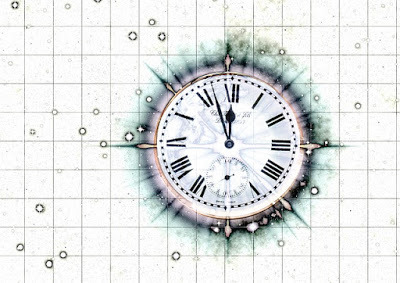
When Things Go Awry
I thought I had all the time in the universe.Literally.I’m the God of Time after all.But my existence was not quite that simple.I found out too late.The sands of the God of Time are running out, felled by such a spiteful thing as jealousy. I knew of my brother’s resentment, but not how the God of History wanted my place in the pantheon. He tried to steal my hourglass totem, but destroyed it instead.Now I will soon be gone.But I will have the last laugh. For when I die, the universe will follow.
~*~
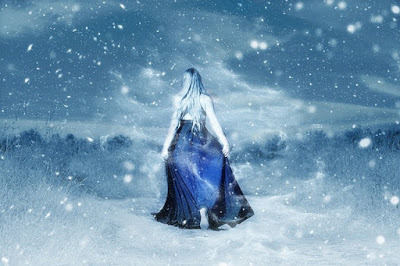
Snows of Change
Winter followed in her footsteps.A goddess of surreal beauty, silver hair and blue satin, swirled in snowflakes and frost, born on northern wind. Barefoot she walked, leaving a trail of prints in the falling snow that surrounded her.She saw a man on the road, his mouth agape; the package he carried fallen unnoticed. She stopped before him, reached out, touched his cheek.“Your world is mine now.”His skin chilled, his blood froze, his heart turned to hoarfrost; he transformed from flesh to ice sculpture. She smiled and walked on. The Winter Queen lived to conquer and destroy.
© A. F. Stewart 2017 All Rights Reserved

The Temple
It stands tall on its island, amid the eternal snow, casting its reflection in the surrounding lake. The Temple of the Dark Gods. So why is it quiet? Why do its halls stay silent? Scarlet stains coat its marble floors and foul air seeps from its walls, a rancid stench of decay. Its gods breathe no more, its rooms house corpses, not deities. Murder came to the Dark Gods and left carnage in its wake. Their own fault, truly. Never raise a shadow you can’t control. They will have to give their shrine a new name. The Temple of Death.
~*~

When Things Go Awry
I thought I had all the time in the universe.Literally.I’m the God of Time after all.But my existence was not quite that simple.I found out too late.The sands of the God of Time are running out, felled by such a spiteful thing as jealousy. I knew of my brother’s resentment, but not how the God of History wanted my place in the pantheon. He tried to steal my hourglass totem, but destroyed it instead.Now I will soon be gone.But I will have the last laugh. For when I die, the universe will follow.
~*~

Snows of Change
Winter followed in her footsteps.A goddess of surreal beauty, silver hair and blue satin, swirled in snowflakes and frost, born on northern wind. Barefoot she walked, leaving a trail of prints in the falling snow that surrounded her.She saw a man on the road, his mouth agape; the package he carried fallen unnoticed. She stopped before him, reached out, touched his cheek.“Your world is mine now.”His skin chilled, his blood froze, his heart turned to hoarfrost; he transformed from flesh to ice sculpture. She smiled and walked on. The Winter Queen lived to conquer and destroy.
© A. F. Stewart 2017 All Rights Reserved
Published on March 08, 2017 05:00
March 7, 2017
Interview With Crime Author Greg Barth
Today I have a interview for you, with author Greg Barth, who chats about writing crime noir, and his books. Enjoy!
Interview With Greg Barth
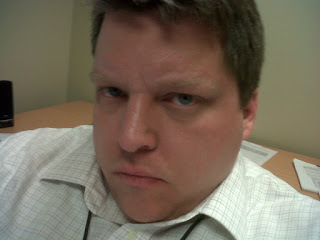 Why don’t you begin by sharing a little about yourself.
Why don’t you begin by sharing a little about yourself.
Sure. I’m Greg Barth, and I write in the crime noir genre. If I am known at all, it’s for the Selena series (Selena, Diesel Therapy, Suicide Lounge, Road Carnage, and the soon-to-be-released series finale, Everglade).I have a thing for characters in desperate situations without good options. I don’t write the traditional thriller novel about someone who is the smartest person in the room, the person who is always right, and who never fails. My characters get in over their heads. My characters make mistakes. My characters get hurt. Sometimes seriously hurt.
Could you tell us a bit about your latest book?
Road Carnage picks up Selena’s story in the bloody aftermath of Suicide Lounge. She is lying low, healing up, and trying to put her life back together. A new enemy comes into her life and threatens her freedom—an elusive young man who holds her fate in hand. This guy has connections to the nastiest criminals in the south. In a desperate attempt to protect herself and those she’s grown to love, Selena blazes a blistering, high-octane path through the southeast leaving blood-drenched carnage in her wake. This is the most visceral and violent entry in the series. Few get out alive. No one gets out unscathed.
Do you have a favourite character? If so, why?
Selena is my favorite character. When we first meet her, she’s an alcoholic, drug addicted, prostitute living careless and sloppy from one high to the next. She’s a stripper who cannot even start her car without proving she is sober to the ignition interlock device installed by the county. When an act of petty theft places her in the crosshairs of a local crime syndicate, Selena is violently knocked over the brink. The only mistake her enemies made was leaving her alive—alive and hungry for revenge.
Why did you decide to write in the noir genre?
I like the high stakes. I like the very real threat that the protagonist just may not make it out alive. It gives the sense that no one is safe. I also like protagonists who aren’t perfect, have no good options, and make mistakes. Costly, often deadly mistakes.
Why did you write this book? What was your inspiration?
There were several pieces of inspiration. TV shows like the Sopranos and Breaking Bad taught me the unpredictability of the anti-hero. Stieg Larsson’s The Girl with the Dragon Tattoo evolved this into the anti-heroine. That one also showed me how a female protagonist can suffer violence and display an emotional range that male characters can’t get away with and still earn sympathy from readers. I was also reading a good bit of Ken Bruen’s Jack Taylor series at the time. Jack, as you may know, is a heavy user of drugs and alcohol. I began to toy with the idea of whether you could pull off a character like that as a female. There’s also a touch of the old rape/revenge movie genre in Selena—think of movies like Death Wish and I Spit on your Grave. Those and a hundred other things inspired the character Selena.
Did anything surprise you about the process of writing your book?
The thing that surprised me the most was learning that building a story and writing a story are two different actions. You must have a story to tell, and stories are made up of several defined components. How you write it (novel, comic, movie script, etc.) is just the medium for the story. I don’t consider myself a particularly gifted writer. I keep it simple. My technique is just going with the basics. I figure it takes an incredibly talented storyteller to tell a mediocre story in a compelling way; so, I make certain I have a strong story. If you have strong story, almost anyone can tell it.
Can you tell us about your writing process? Where do your ideas originate? Do you have a certain writing routine?
I write every day, but I don’t “write” every day. In other words, I’m always turning ideas over in my head, coming up with scenes, connecting them to other scenes; but I don’t sit down and peck away at the keyboard every day. I have a lengthy commute. I spend 70 miles in the car five days per week. During that time, I am listening to music and daydreaming scenes in my head. At night, I’ll jot them down on a digital corkboard. Once I have three or four strong scenes, scenes that can carry a book, I come up with the sequences that lead up to each scene. Once I have those, it’s time to write. The actual writing takes about two weeks to get the first draft. That’s because I already have the book in my head, I just have to get it down. When I am actually writing (pecking away at the keyboard), I get quite manic. I can’t sleep much, and when I do I dream as my characters. I’m constantly waking, typing—it’s almost non-stop mania until I get the first draft done. Then comes the polish.
What is your greatest challenge as a writer?
The hardest part of the writing process is what comes after the book is published. Writing is a lonely, personal craft. I enjoy building the story, writing the story, and applying the first coat of polish. If writing is a solo effort, publishing is a team sport. There are a few rounds of edits during which you are working with a professional team. By the time the book is actually published, I’ve read the manuscript so many times I am too close to it to even know if it’s any good. Once it’s out, you are left waiting for reactions from your readers. Will they like it? Will they think it sucks? You never know. Someone once said, If you don’t want the thing you created to suffer criticism, then it’s better to not create anything to begin with. It’s always a little scary to have this thing you created out there for everyone’s reaction.
Do you have a favourite author, or writing inspiration?
Richard Stark is my favorite author. Stark is one of the pen names used by Donald E. Westlake, but I always think of him as Stark. His character, Parker, was my first introduction to a protagonist who is completely amoral. Parker was a shock to the system at the time and has been a steady supply of literary crack that I go back to time and again. That twenty-four-volume series is just perfect.
How do you research your books?
YouTube. You can learn anything on YouTube. How to fire any weapon? Check. How to smoke hash resin? Check. How to make baked spaghetti? It’s all on YouTube.
What advice would you give beginning writers?
If you aren’t rich, get a good day job. The best you can find—something professionally and financially fulfilling. You’re going to need it. Either that or a spouse who can support your family financially. There’s no comfortable living to be made in writing. I think of writing as a craft. A simple art. My grandparents used to make quilts. They were good at it. Every now and then they’d sell one or two. I think of my books like that—craft quilts—only I can sell these over and over. It’s fun. It’s fulfilling. It brings a lot of satisfaction. If you crack the code and find a way to make a comfortable living as a writer, then I’ll be asking you for advice.
About the Author:
Greg Barth is the author of Selena, Diesel Therapy, Suicide Lounge, Road Carnage, Bona Fide Jobs,Where Moth and Rust Corrupt, and Everglade. Greg cut his literary teeth by reading the Parker novels by Richard Stark. The Stark influence is evident in Barth's lean, compact prose. As a fiction writer, he has a thing for amoral characters in bad situations; without good options, they proceed to make things worse for themselves. A devoted fan of noir fiction in all its forms, Greg is also the host of Noir on the Radio, an affiliate of the Authors on the Air Global Network. He lives and writes in Bowling Green, KY.
For more about the author and his works, visit his publisher’s website: All Due Respect
Or see what he has planned on his Amazon Author Page
Join host Greg Barth on Noir on the Radio and experience rare glimpses into the creative lives of authors of noir and crime fiction from around the globe. Call in and ask the him or the guest a question.
For info on upcoming live shows or podcasts: https://www.facebook.com/NoirOnTheRadio/
Interview With Greg Barth
 Why don’t you begin by sharing a little about yourself.
Why don’t you begin by sharing a little about yourself.
Sure. I’m Greg Barth, and I write in the crime noir genre. If I am known at all, it’s for the Selena series (Selena, Diesel Therapy, Suicide Lounge, Road Carnage, and the soon-to-be-released series finale, Everglade).I have a thing for characters in desperate situations without good options. I don’t write the traditional thriller novel about someone who is the smartest person in the room, the person who is always right, and who never fails. My characters get in over their heads. My characters make mistakes. My characters get hurt. Sometimes seriously hurt.
Could you tell us a bit about your latest book?
Road Carnage picks up Selena’s story in the bloody aftermath of Suicide Lounge. She is lying low, healing up, and trying to put her life back together. A new enemy comes into her life and threatens her freedom—an elusive young man who holds her fate in hand. This guy has connections to the nastiest criminals in the south. In a desperate attempt to protect herself and those she’s grown to love, Selena blazes a blistering, high-octane path through the southeast leaving blood-drenched carnage in her wake. This is the most visceral and violent entry in the series. Few get out alive. No one gets out unscathed.
Do you have a favourite character? If so, why?
Selena is my favorite character. When we first meet her, she’s an alcoholic, drug addicted, prostitute living careless and sloppy from one high to the next. She’s a stripper who cannot even start her car without proving she is sober to the ignition interlock device installed by the county. When an act of petty theft places her in the crosshairs of a local crime syndicate, Selena is violently knocked over the brink. The only mistake her enemies made was leaving her alive—alive and hungry for revenge.
Why did you decide to write in the noir genre?
I like the high stakes. I like the very real threat that the protagonist just may not make it out alive. It gives the sense that no one is safe. I also like protagonists who aren’t perfect, have no good options, and make mistakes. Costly, often deadly mistakes.
Why did you write this book? What was your inspiration?
There were several pieces of inspiration. TV shows like the Sopranos and Breaking Bad taught me the unpredictability of the anti-hero. Stieg Larsson’s The Girl with the Dragon Tattoo evolved this into the anti-heroine. That one also showed me how a female protagonist can suffer violence and display an emotional range that male characters can’t get away with and still earn sympathy from readers. I was also reading a good bit of Ken Bruen’s Jack Taylor series at the time. Jack, as you may know, is a heavy user of drugs and alcohol. I began to toy with the idea of whether you could pull off a character like that as a female. There’s also a touch of the old rape/revenge movie genre in Selena—think of movies like Death Wish and I Spit on your Grave. Those and a hundred other things inspired the character Selena.
Did anything surprise you about the process of writing your book?
The thing that surprised me the most was learning that building a story and writing a story are two different actions. You must have a story to tell, and stories are made up of several defined components. How you write it (novel, comic, movie script, etc.) is just the medium for the story. I don’t consider myself a particularly gifted writer. I keep it simple. My technique is just going with the basics. I figure it takes an incredibly talented storyteller to tell a mediocre story in a compelling way; so, I make certain I have a strong story. If you have strong story, almost anyone can tell it.
Can you tell us about your writing process? Where do your ideas originate? Do you have a certain writing routine?
I write every day, but I don’t “write” every day. In other words, I’m always turning ideas over in my head, coming up with scenes, connecting them to other scenes; but I don’t sit down and peck away at the keyboard every day. I have a lengthy commute. I spend 70 miles in the car five days per week. During that time, I am listening to music and daydreaming scenes in my head. At night, I’ll jot them down on a digital corkboard. Once I have three or four strong scenes, scenes that can carry a book, I come up with the sequences that lead up to each scene. Once I have those, it’s time to write. The actual writing takes about two weeks to get the first draft. That’s because I already have the book in my head, I just have to get it down. When I am actually writing (pecking away at the keyboard), I get quite manic. I can’t sleep much, and when I do I dream as my characters. I’m constantly waking, typing—it’s almost non-stop mania until I get the first draft done. Then comes the polish.
What is your greatest challenge as a writer?
The hardest part of the writing process is what comes after the book is published. Writing is a lonely, personal craft. I enjoy building the story, writing the story, and applying the first coat of polish. If writing is a solo effort, publishing is a team sport. There are a few rounds of edits during which you are working with a professional team. By the time the book is actually published, I’ve read the manuscript so many times I am too close to it to even know if it’s any good. Once it’s out, you are left waiting for reactions from your readers. Will they like it? Will they think it sucks? You never know. Someone once said, If you don’t want the thing you created to suffer criticism, then it’s better to not create anything to begin with. It’s always a little scary to have this thing you created out there for everyone’s reaction.
Do you have a favourite author, or writing inspiration?
Richard Stark is my favorite author. Stark is one of the pen names used by Donald E. Westlake, but I always think of him as Stark. His character, Parker, was my first introduction to a protagonist who is completely amoral. Parker was a shock to the system at the time and has been a steady supply of literary crack that I go back to time and again. That twenty-four-volume series is just perfect.
How do you research your books?
YouTube. You can learn anything on YouTube. How to fire any weapon? Check. How to smoke hash resin? Check. How to make baked spaghetti? It’s all on YouTube.
What advice would you give beginning writers?
If you aren’t rich, get a good day job. The best you can find—something professionally and financially fulfilling. You’re going to need it. Either that or a spouse who can support your family financially. There’s no comfortable living to be made in writing. I think of writing as a craft. A simple art. My grandparents used to make quilts. They were good at it. Every now and then they’d sell one or two. I think of my books like that—craft quilts—only I can sell these over and over. It’s fun. It’s fulfilling. It brings a lot of satisfaction. If you crack the code and find a way to make a comfortable living as a writer, then I’ll be asking you for advice.
About the Author:
Greg Barth is the author of Selena, Diesel Therapy, Suicide Lounge, Road Carnage, Bona Fide Jobs,Where Moth and Rust Corrupt, and Everglade. Greg cut his literary teeth by reading the Parker novels by Richard Stark. The Stark influence is evident in Barth's lean, compact prose. As a fiction writer, he has a thing for amoral characters in bad situations; without good options, they proceed to make things worse for themselves. A devoted fan of noir fiction in all its forms, Greg is also the host of Noir on the Radio, an affiliate of the Authors on the Air Global Network. He lives and writes in Bowling Green, KY.
For more about the author and his works, visit his publisher’s website: All Due Respect
Or see what he has planned on his Amazon Author Page
Join host Greg Barth on Noir on the Radio and experience rare glimpses into the creative lives of authors of noir and crime fiction from around the globe. Call in and ask the him or the guest a question.
For info on upcoming live shows or podcasts: https://www.facebook.com/NoirOnTheRadio/
Published on March 07, 2017 05:00
March 5, 2017
Cover Reveal: Camp Nightmare
Today I have a cover reveal, for the horror thriller short story, Camp Nightmare by Franny Marie. Enjoy!
★★★★★★★★★★★★★★★★★★★★
[image error]
★★★★★★★★★★★★★★★★★★★★
[image error]
Published on March 05, 2017 14:00
March 4, 2017
Interview With Author Caleb Peiffer
Today I have an great interview with multi-genre author Caleb Peiffer, who talks about his writing and his new release, Tortured Worlds. And as a special bonus this book with be available free on Amazon March 5th and 6th. Enjoy!
Interview With Caleb Peiffer
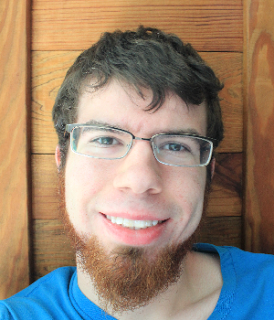
Why don’t you begin by sharing a little about yourself.
The first chapter book I read as a kid was Beverly Cleary's The Mouse and the Motorcycle. That was it for me. I knew I wanted to be a writer. And I never stopped wanting it. So I wrote fan fiction for a long time. Then when I was seventeen I wrote my first novel, and published independently the next year. That was only four years ago. Since then I've written four more novels and a slew of short stories. At times, I'm more productive than at others. But the only trick I know is to keep going, and never stop.
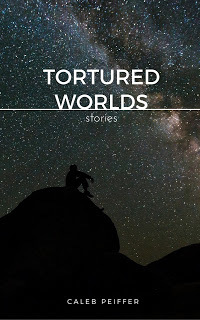 Could you tell us a bit about your latest book?
Could you tell us a bit about your latest book?
Tortured Worlds is a collection of five short stories, landing across the spectrum of speculative fiction. One's post-apocalyptic, one's alien contact, one's dystopian, one's fantasy, and one's sort of hard to define, pan-genre if you will. So they're all very different. I even wrote some of them years apart. But the thread that links these stories together is the pain the characters experience, and overcome. They're all tortured in some way, and that's the root of their conflicts. It's a loose connection, but I like it that way.
Why did you decide to write in the speculative fiction genre?
When I started out writing fan fiction, they'd usually be adventures, mostly fantasy. Then I gradually moved in a science fiction direction. My first three novels were mysteries, and that was a new genre for me but it was one I'd read the most of. And now that I was writing seriously, science fiction started calling me back, and I came running. I think what appeals to me about it its big-picture view: if this is what the world looks like now, what could it lead to next, or what must have come before to bring it here? You have free range to speculate. That's why sci-fi is often called speculative fiction.
You write in several genres. Do you have a favourite? And if so, why?
No, I don't think I do. If I had a favorite genre, it would be pan-genre, stories with a little bit of everything. Because I can't choose just one. I love mysteries, and I love high fantasy and fairy tales, and I love science fiction. If I ever tried to settle down in one and just write that forever, I'd drive myself crazy. I like keeping my horizons broad.
What did you hope to accomplish by publishing your book?
I think every writer writes for two main reasons: self-expression, and entertainment. Most writers I know turn to stories because they don't have many other outlets to express themselves creatively. And every writer wants to entertain their readers, and themselves. So those are the reasons. But then there's the hopes. I hope to touch people and affect their lives through my writing, even in some small way. I guess with Tortured Worlds, what I hope for most is that it will find its way to someone in a dark place, and that they'll find an uplifting message in one of my stories. I want people like them to know that darkness doesn't last forever, and dragons can be slain.
Can you tell us about your writing process? Where do your ideas originate? Do you have a certain writing routine?
I try to write every day. I used to be very good at that, and even now that I have less free time on my hands, I still do the best I can. If I didn't, then all these ideas floating around in my head would be trapped there forever, and eventually I'd go out of my mind. As for where the ideas come from, who knows? They come from connections, I can tell you that much. Putting little pieces of your experiences together in new ways. They come from the everyday what-ifs. Sometimes they come to me while I'm watching TV or reading a book, and I'll think, "What if the story had happened this way?" or "What if this character was like this instead?" And then, an idea is born.
Do you have a favourite author, or writing inspiration?
Oh, definitely. Many different ones. When it comes to mystery, Agatha Christie inspired me the most, hands-down. For fantasy it was Baum and Tolkien, and the likes of them. C.S. Lewis's Space Trilogy has been the strongest influence on my science fiction. And when it comes to my writing in general, I already mentioned that Beverly Cleary was the first one to inspire me. But the number one writer, or artist I should say, who has influenced me the most, isn't even a novelist. Bill Watterson, author of the Calvin and Hobbes comic series, is the most masterful artist I know, and has always been my greatest creative inspiration.
What advice would you give beginning writers?
Write more. Write everything you can. And write patiently. Don't get discouraged, and don't stop. You'll never regret writing something, I can guarantee you that. You'll never look back and say, "Man, if only I hadn't written that." But you will look back and regret not having written more. So keep writing.
What’s your next project? Any upcoming book secrets you care to reveal?
Well, I have a fairy tale that I think will appeal to both children and adults in the works. The first draft is written, now it just needs to go through the rigorous process of editing and rewriting. I also have a lot more speculative short stories I'm working on. I'm definitely planning to put a few more collections out there this year.
About the Author:
Caleb Peiffer writes mystery, fantasy, science fiction, or just about anything. Growing up, he always wanted to write, so now that's what he does. When he's not writing, he's reading, or planning what to write next. He lives in paradise on the east coast of Florida. Get to know him at CalebPeiffer.com

Tortured Worlds by Caleb Peiffer
A post-apocalyptic winter, superpowered aliens, a machine that controls the planets' movement, immortal love, and voices echoing from nowhere. These are just some of the things that torture the worlds you'll find in these stories.
The Tortured Worlds collection features five stories of science fiction and fantasy
You can find his new speculative fiction story collection Tortured Worlds on Amazon, and don't forget it's on free promotion March 5th and 6th.
Interview With Caleb Peiffer

Why don’t you begin by sharing a little about yourself.
The first chapter book I read as a kid was Beverly Cleary's The Mouse and the Motorcycle. That was it for me. I knew I wanted to be a writer. And I never stopped wanting it. So I wrote fan fiction for a long time. Then when I was seventeen I wrote my first novel, and published independently the next year. That was only four years ago. Since then I've written four more novels and a slew of short stories. At times, I'm more productive than at others. But the only trick I know is to keep going, and never stop.
 Could you tell us a bit about your latest book?
Could you tell us a bit about your latest book?Tortured Worlds is a collection of five short stories, landing across the spectrum of speculative fiction. One's post-apocalyptic, one's alien contact, one's dystopian, one's fantasy, and one's sort of hard to define, pan-genre if you will. So they're all very different. I even wrote some of them years apart. But the thread that links these stories together is the pain the characters experience, and overcome. They're all tortured in some way, and that's the root of their conflicts. It's a loose connection, but I like it that way.
Why did you decide to write in the speculative fiction genre?
When I started out writing fan fiction, they'd usually be adventures, mostly fantasy. Then I gradually moved in a science fiction direction. My first three novels were mysteries, and that was a new genre for me but it was one I'd read the most of. And now that I was writing seriously, science fiction started calling me back, and I came running. I think what appeals to me about it its big-picture view: if this is what the world looks like now, what could it lead to next, or what must have come before to bring it here? You have free range to speculate. That's why sci-fi is often called speculative fiction.
You write in several genres. Do you have a favourite? And if so, why?
No, I don't think I do. If I had a favorite genre, it would be pan-genre, stories with a little bit of everything. Because I can't choose just one. I love mysteries, and I love high fantasy and fairy tales, and I love science fiction. If I ever tried to settle down in one and just write that forever, I'd drive myself crazy. I like keeping my horizons broad.
What did you hope to accomplish by publishing your book?
I think every writer writes for two main reasons: self-expression, and entertainment. Most writers I know turn to stories because they don't have many other outlets to express themselves creatively. And every writer wants to entertain their readers, and themselves. So those are the reasons. But then there's the hopes. I hope to touch people and affect their lives through my writing, even in some small way. I guess with Tortured Worlds, what I hope for most is that it will find its way to someone in a dark place, and that they'll find an uplifting message in one of my stories. I want people like them to know that darkness doesn't last forever, and dragons can be slain.
Can you tell us about your writing process? Where do your ideas originate? Do you have a certain writing routine?
I try to write every day. I used to be very good at that, and even now that I have less free time on my hands, I still do the best I can. If I didn't, then all these ideas floating around in my head would be trapped there forever, and eventually I'd go out of my mind. As for where the ideas come from, who knows? They come from connections, I can tell you that much. Putting little pieces of your experiences together in new ways. They come from the everyday what-ifs. Sometimes they come to me while I'm watching TV or reading a book, and I'll think, "What if the story had happened this way?" or "What if this character was like this instead?" And then, an idea is born.
Do you have a favourite author, or writing inspiration?
Oh, definitely. Many different ones. When it comes to mystery, Agatha Christie inspired me the most, hands-down. For fantasy it was Baum and Tolkien, and the likes of them. C.S. Lewis's Space Trilogy has been the strongest influence on my science fiction. And when it comes to my writing in general, I already mentioned that Beverly Cleary was the first one to inspire me. But the number one writer, or artist I should say, who has influenced me the most, isn't even a novelist. Bill Watterson, author of the Calvin and Hobbes comic series, is the most masterful artist I know, and has always been my greatest creative inspiration.
What advice would you give beginning writers?
Write more. Write everything you can. And write patiently. Don't get discouraged, and don't stop. You'll never regret writing something, I can guarantee you that. You'll never look back and say, "Man, if only I hadn't written that." But you will look back and regret not having written more. So keep writing.
What’s your next project? Any upcoming book secrets you care to reveal?
Well, I have a fairy tale that I think will appeal to both children and adults in the works. The first draft is written, now it just needs to go through the rigorous process of editing and rewriting. I also have a lot more speculative short stories I'm working on. I'm definitely planning to put a few more collections out there this year.
About the Author:
Caleb Peiffer writes mystery, fantasy, science fiction, or just about anything. Growing up, he always wanted to write, so now that's what he does. When he's not writing, he's reading, or planning what to write next. He lives in paradise on the east coast of Florida. Get to know him at CalebPeiffer.com

Tortured Worlds by Caleb Peiffer
A post-apocalyptic winter, superpowered aliens, a machine that controls the planets' movement, immortal love, and voices echoing from nowhere. These are just some of the things that torture the worlds you'll find in these stories.
The Tortured Worlds collection features five stories of science fiction and fantasy
You can find his new speculative fiction story collection Tortured Worlds on Amazon, and don't forget it's on free promotion March 5th and 6th.
Published on March 04, 2017 05:00



